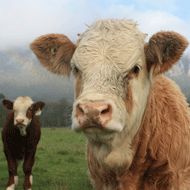Small decline in herds affected by bTB

"Today’s figures re-emphasise the need for the 25-year TB eradication strategy for England published by the current government last April to be implemented in full - and as quickly as possible."
There has been a small decline in the number of new herds affected by bovine tuberculosis (bTB), according to latest government statistics.
The number of new herd incidents of the disease during the period January to December 2014, was 4,713, compared to 4,808 for January to December 2013.
Disappointed by the news, the National Farmers Union (NFU) said that the small decline in the number of new herds affected by bTB in 2014 'is not good enough'.
They argue the figures reinforce the need to implement the government's bTB eradication strategy for England in full, to wipe-out the disease as quickly as possible.
NFU deputy president, Minette Batters, commented: “No-one can say today’s figures are good news because more than 4,700 herds that had been clear of bTB were affected by it last year. And although the number of animals slaughtered because of the disease fell slightly in England, it rose sharply in Wales.
“These figures are not good news for the thousands of farmers who are still dealing with the consequences of bTB on their farms every day. They are not good news for farmers in those parts of the country where bTB is still spreading. And they are certainly not good enough if we are serious in our aim to see bTB eradicated from England.
“This is simply not acceptable. Today’s figures re-emphasise the need for the 25-year TB eradication strategy for England published by the current government last April to be implemented in full - and as quickly as possible. It is the first comprehensive plan we’ve had to wipe out this disease and it’s vital that it is put into effect in full if we are going to stand a chance of winning the fight against this terrible disease.
The NFU say that they remain committed to the control and eradication of bovine TB using all available options, such as badger vaccination, cattle vaccination and the use of appropriate cattle testing and movement controls.
Minette added: “But if we are ever going to control and eradicate bTB these options have to include controlling the disease in badgers in areas where it is rife. Only by doing this will we achieve what everyone wants – healthy badgers, healthy cattle and a TB free England.”



 The latest
The latest